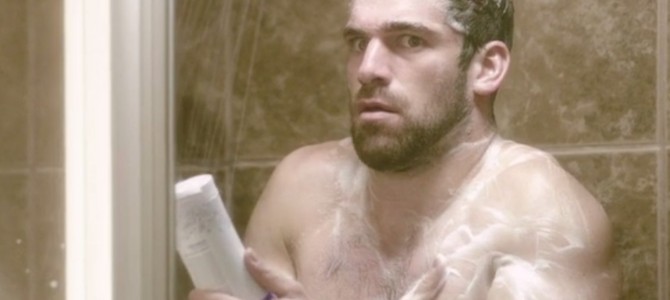
Summer’s Eve has an amusing new commercial – “Manly Mistake:”
If there is one thing we can agree on, it is that masculinity is defined by the type of soap we use. As such, the husband in “Manly Mistake” scrubbed his away in a foamy Island Splash scented wash. To restore balance to the universe, he had but one choice – embark on a massive campaign of many manly activities designed to reclaim that lost masculinity.
He chops wood, drinks raw eggs, plays the drums, beats on the punching bag, belly flops, karate chops, pulls a car with his teeth, makes an awesome Spartacus helmet, mows his yard and then pounds and crushes what is presumably a can of beer. At the completion of his campaign across the metaphorical Alps, his wife, dripping sarcasm, proclaims, “That was close.” Hooray, masculinity reclaimed!
It is a brilliant commercial, but I am not one of those humorless types who gets my knickers in a twist over every perceived slight. Nonetheless, the ad offers a glimpse into how silly discussions about masculinity can be.
“Masculinity is in the eye of the beholder,” said one student to kick off our conversation. “Look at the bygone days of cowboy movies. Masculinity then was controlling a horse, controlling a woman with few words, not complaining, smoking cigarettes and settling disagreements with your piece.”
“It still is, kinda,” another student chimed in. “Maybe not here in our safe haven at Dartmouth, but check out the news. Look at the shootings over simple disputes, look at the domestic violence rates, look at some of the problems that arise due to men not sharing their emotions. And in some ways owning a nice car has replaced the status symbol of riding a horse around.”
Through that lens, “Manly Mistake” suggests that if a man accidentally uses a soap designed for the V, he must spend the rest of the day proving he does not have one. It all makes sense. This is why my father, who for years used my mother’s Secret rather than buying his own deodorant, was always so focused on hunting, fishing, Boy Scouting, wood gathering, and other activities that proved his male bonafides – he was compensating! If only he had opportunity to ride a horse and participate in a duel. Actually, he may have gone for that in his younger days had he been given the opportunity, so maybe what the Delta House dudes said above has some merit. As Camille Paglia recently noted:
“Masculinity is just becoming something that is imitated from the movies. There’s nothing left. There’s no room for anything manly right now.” The only place you can hear what men really feel these days, she claims, is on sports radio. No surprise, she is an avid listener. The energy and enthusiasm “inspires me as a writer,” she says, adding: “If we had to go to war,” the callers “are the men that would save the nation.”
Paglia is correct that there are cultural factors at play, but as U.S. Census Bureau data shows, one in three of children live in homes without the presence of a biological father. That leaves a vacuum that pop culture can seek to fill. But there are arguments to be made that men are always presented as stumbling buffoons in pop culture, so that may not be the best place to look for a solid definition of masculinity. Of course, even if fathers are not depicted as buffoons, there is still the matter of heteronormativity and how it relates to marketing specifically.
Studies show that, on average, women do three to four times as much housework as men, even when they both work full time. Imagine you’re an advertiser selling a new cleaning product, who are you going to target? The wife. And might it occur to you to target the wife by showing her you know how hard she works by plopping her “lazy” husband on the couch while she scrubs? And might your target woman identify with your ad and buy your product? She just might. This is what advertisers are banking on when they find a handy hook. No matter how hetero-normative or insulting it might be, if it works, they use it.
Heternormative, oh no! However shall we cope?!? Also, why are these arguments never about yard work and vehicle maintenance? Never mind. Forget I asked. But still, why would the man in “Manly Mistake” undertake such a massive effort merely because he used his wife’s soap? Perhaps a thought experiment is in order.
Imagine “Manly Mistake,” but with the roles reversed. The scene opens with a man shaving, his woman reflected in the mirror, scrubbing herself with a loofa. “Did you know that Axe Body Wash is scientifically designed to cause paid actresses to dogpile paid actors in commercials for Axe Body Wash so as to convince teenage boys that a foul-smelling soap will make them irresistible to teenage girls?” Girl pauses and offers a perplexed look “Did you know you’re using it?” The girl, in a furious attempt to reclaim her femininity, then proceeds to bake cookies, vacuum the house, get her hair done, buy some new shoes, send 4000 text messages, and finally delicately sip a Cosmo at happy hour with her girlfriends.
Do you know why that commercial would never be made? Outrage over the offensive heteronormativity of it all? Not by a long shot. It would never be made for the exact same reason the Summer’s Eve commercial was made – the target audience. The target audience for “Manly Mistake” is women and the messaging is brilliant and subtle. “Use Summer’s Eve and you’ll attract a buff alpha male who splits wood, welds, gladly endures pain, and can drag a car with his teeth. Also, he’ll maintain a nice yard, earn enough for you to have a house with a pool, and handle all the yard work.” If Axe made the commercial I outlined above, the message would be, “Use Axe and your woman will do anything and everything possible to avoid having relations with you.” Heteronormative? Perhaps. Or as normal people call it, simple biology.
In one of the largest studies looking at the “connectomes” of the sexes, Ragini Verma, PhD, an associate professor in the department of Radiology at the Perelman School of Medicine at the University of Pennsylvania, and colleagues found greater neural connectivity from front to back and within one hemisphere in males, suggesting their brains are structured to facilitate connectivity between perception and coordinated action. In contrast, in females, the wiring goes between the left and right hemispheres, suggesting that they facilitate communication between the analytical and intuition.
“These maps show us a stark difference–and complementarity–in the architecture of the human brain that helps provide a potential neural basis as to why men excel at certain tasks, and women at others,” said Verma.
Or in Mark Twain’s more poetic formulation: “What would men be without women? Scarce, sir…mighty scarce.” Perhaps masculinity is in the eye of the beholder, not because of “The Good, the Bad, and the Ugly,” but because we know, deep in our lizard brains, that men and women are different. We know that we are designed to complement one another. Women nurture, men conquer. There is some variance in the level of nurturing and conquering we seek, thus no objective standards, but it is still not the wild west of “social constructs.”
This is why “Manly Mistake” is such a brilliant commercial. It subtly highlights our complementarity in a humorous fashion that avoids inciting the “OMG! So Stereotypical and heteronormative!” brigades. By making the focus of the commercial the husband reclaiming his scrubbed-away masculinity, Summer’s Eve deftly reached the demographic group the company was targeting. Those who live to be professionally outraged can likely divine a way to be outraged about the commercial, but the rest of us should celebrate the fact that “Manly Mistake” completely abjures political correctness and instead goes with the timeless truth that pretty girls tend to like rugged men, even if the suburbs cause them to have to be creatively rugged.









